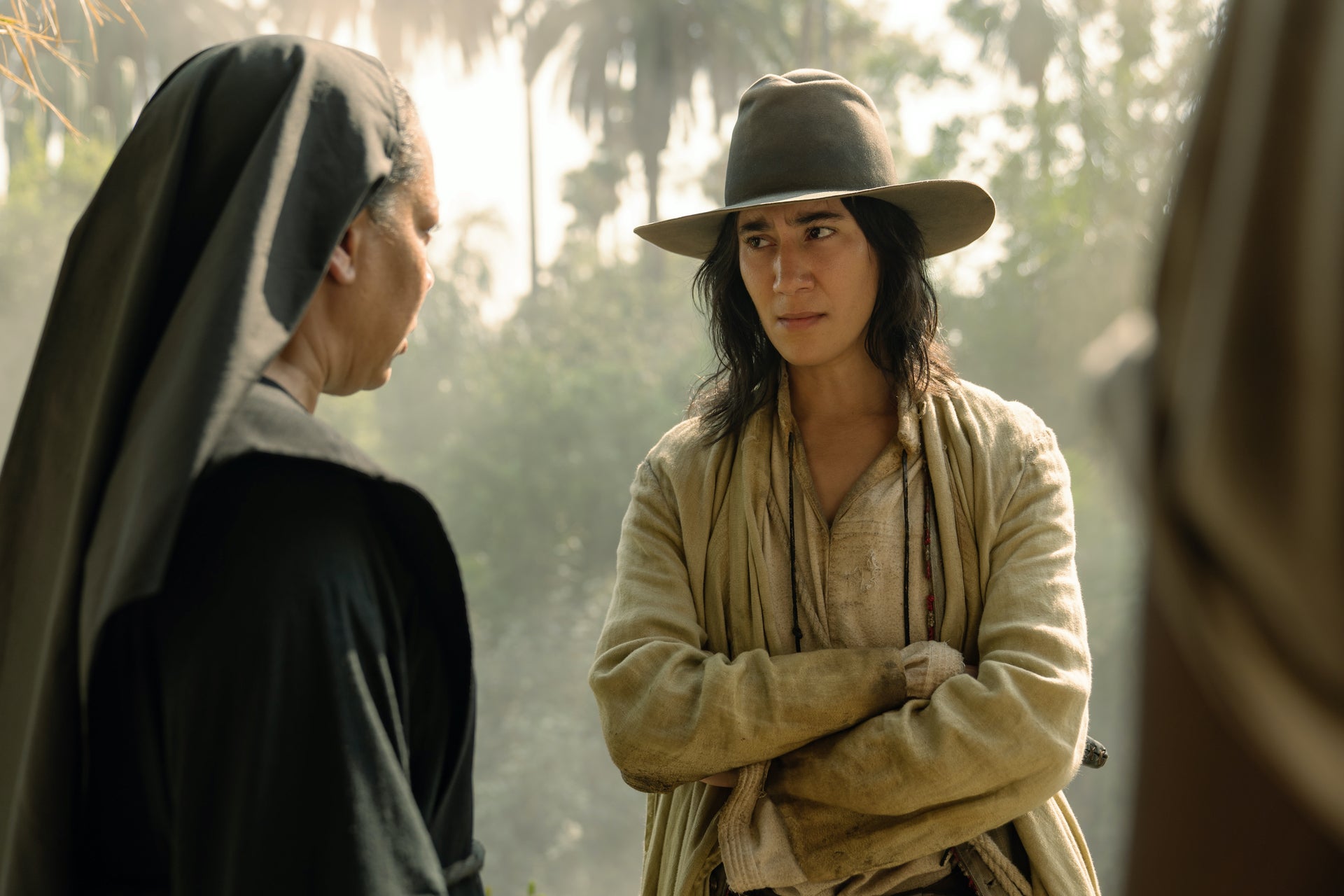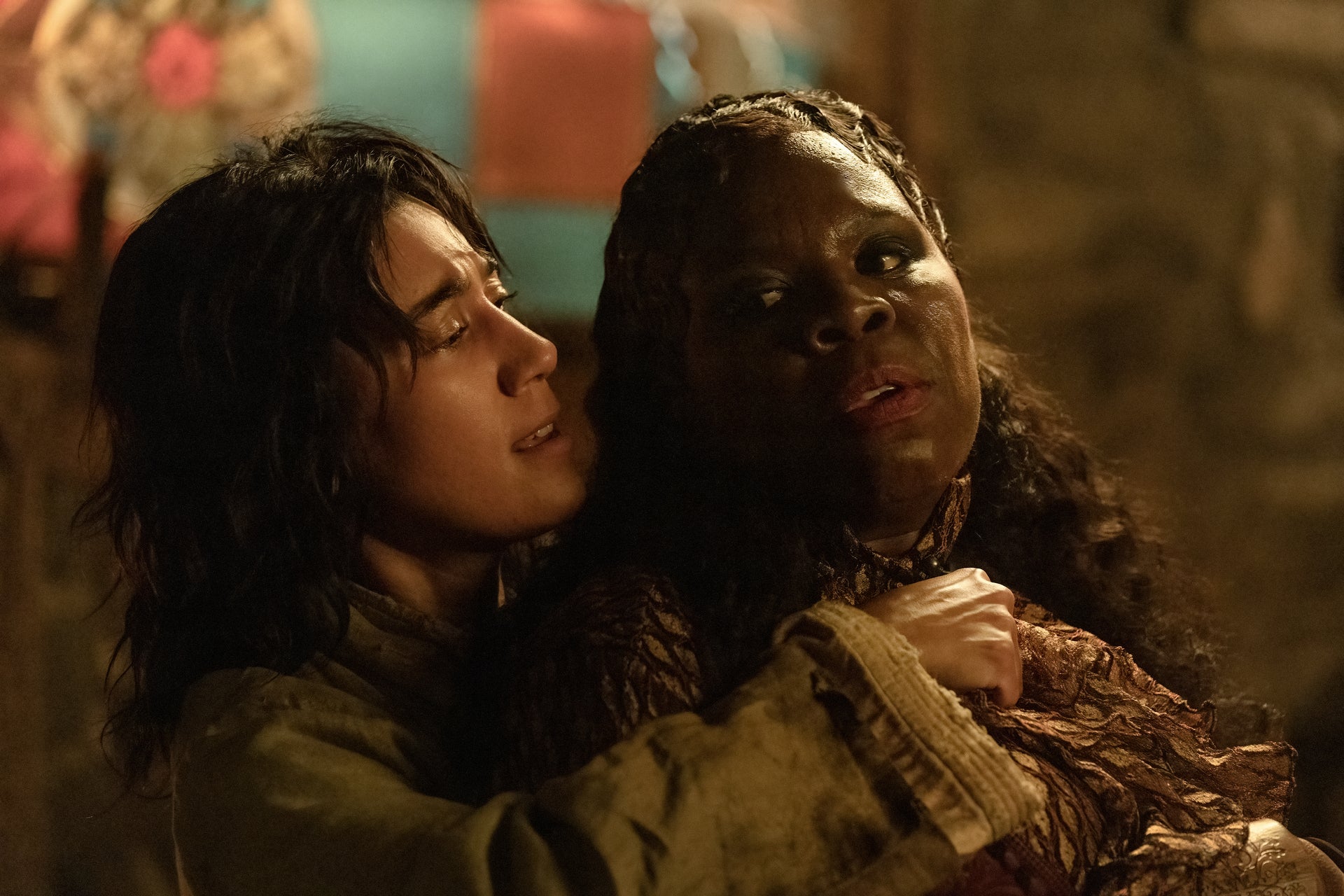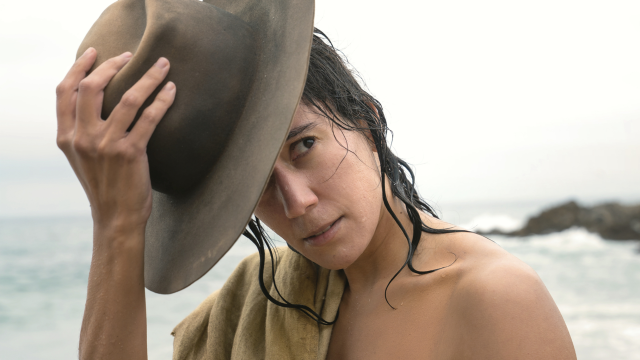“I knew my character was going to be the queer one,” Vico Ortiz said in our interview last week. “I’m used to being the queer one.” Ortiz is speaking about their role in the hit pirate comedy, Our Flag Means Death. Their character, Jim (shortened from their last name, Jiminez), is a transgender, nonbinary, Latine person who uses they/them pronouns… just like Ortiz.
The thing is though, Our Flag Means Death doesn’t just have one queer character. Ortiz wasn’t the queer one, but one of the queers, a part of an expansively queer cast that centered queerness in the storytelling. With a small timeframe and a smaller budget, writer-director David Jenkins created a queer workplace comedy that took a swift detour into a historical high-seas romance, bodice-ripping included. “When I read the pilot, I thought to myself, ‘you know this is pretty gay’, but I never thought the show would go that far,” Ortiz explained to Gizmodo over video chat recently.
While the romantic pillar of the show was the relationship between Stede Bonnet (Rhys Darby) and Blackbeard–also known as Edward Teach (Taika Waititi)–they were hardly the only pair to get a romance. In addition to Jim and their love interest, Oluwande (Samson Kayo), Lucius Spriggs (Nathan Foad) had a romance with Black Pete (Matthew Maher) and a dalliance with Fang (David Fane), Calico Jack (Will Arnett) and Teach had a confirmed romantic past together, and Spanish Jackie (Leslie Jones) went for polyamory with her harem of husbands. You can feel free to read subtext into many of the characters, but when I watched the first season, I personally subscribed to the newsletter of repressed self-hating gay man, Izzy Hands (Con O’Neill). “The way they handled so many of the characters and relationships in the show was beautiful,” Ortiz told Gizmodo. “It was so healing, honestly, to see all these different kinds of queers on screen.” In Our Flag Means Death queerness isn’t relegated to the sidelines of the story, but made the focus, the fulcrum on which the whole show hinges.
I asked Ortiz about how it feels to be a part of something that has garnered a massive, outspoken fandom. “It’s surreal,” they said immediately. They’ve been a part of their local queer scene in Los Angeles for years, and now they go out to a show and they’re recognised. Within months of the release of Our Flag Means Death, fanart, fanfiction, and meta popped up all over the internet. The hashtag #RenewOurFlagMeansDeath has been used across Twitter and Tumblr in the hundreds of thousands — much to the rejoice of today’s news, timed to the first day of Pride month, that confirmed the show would return for season two. To call the show a phenomenon is not an understatement. Ortiz’ Jim is receiving a lot of love, not just because their character is fundamentally a badass, but because of Ortiz themselves. Ortiz has shared BTS set photos, made TikToks to trending sounds cosplaying as characters, and has interacted with their fans at every level. They’re not just an actor, they’re a fan too. And an incredibly accessible one at that. “It’s definitely a bit of an adjustment, but it’s so beautiful. I’ve found that most people who approach me are younger queer people, or younger Latine people, who are excited to see someone like them on screen.”

Ortiz is right. There are very few nonbinary actors acting in explicitly nonbinary roles, and even fewer nonbinary Latines acting in roles that reflect their heritage and identity. Ortiz is, whether they like it or not, now a significant stitch in a larger mosaic of television representation that has, for a very long time, not held space for trans people. “These kids tell me that watching Jim has given them that extra push to be who they are — to come out, or pursue a different career, or…” Ortiz, for a second, looked overwhelmed as they answered. But only for a second. Nothing ever seems to catch up to Ortiz, who talks a mile a minute with a smile the whole time. Instead, they shook their head, hands spread, grinning, “Holy wow.”
The fandom that has coalesced around Our Flag Means Death did so with speed, and not just because it’s a show about characters being queer, but because it is, at its core, a queer show. It explores queerness without being explicitly about the act of queerness; without using contemporary terminology or sterile textbook explanations that include a narrative record scratch as people explain, in detail, that they identify as bisexual. Instead, by letting the characters expose themselves through their actions and emotional reactions, Our Flag Means Death offers a considered alternative that feels easy… because sometimes, it is.
Our Flag Means Death “introduces a lot of these [queer] themes and subjects in a way that’s subtle, that’s not in your face. You take a journey with these characters, and then all of a sudden you’re falling in love with them in very sympathetic ways,” explained Ortiz. In the first two or three episodes, there’s definitely this campy, queer energy to the plot and dialogue, but it doesn’t feel obtuse. When Blackbeard shows up at the beginning of the fourth episode all the pieces begin to slot together — the queerness of Jim (and Lucius, Pete, Jackie, and all the rest) makes sense in context, because they aren’t outliers. Each character is integral to the understanding of the very fabric of the show. Because a found-family romance about rejecting what people think of you in order to live in your truth? That’s very, very queer.
I was curious about how Jim was created, and if they were always supposed to be nonbinary. “I don’t know who Jim was before I got there,” Ortiz said, “but as soon as I got the scripts it was clear the writers knew what they were doing.”
The writer’s room, Ortiz told us, had three trans and/or nonbinary individuals on staff. When there are people in a writer’s room who understand trans and gender non-conforming identities in a personal, experiential way, Ortiz said, you will have “people advocating for that character behind the scenes.” With nuanced, informed experience creating space for the stories of trans characters to play out on screen without any excuses or hand-holding.
“I’m used to being the only nonbinary person on set,” Ortiz explained. Usually the production hires one trans writer or one trans actor, and it becomes clear that there’s not a lot of care put into any single nonbinary character. “And then as the actor, you assume responsibility for educating people. Which shouldn’t be a part of it. But it just happens.” They shrug. What’s the alternative to speaking up? A bad character, poorly made, a stereotype of a stereotype. Ortiz states that they enjoy having these conversations with people, but they are working on “setting better boundaries.”
By this point in the interview, Ortiz has mentioned Con O’Neill (they said “I know that Izzy and Jim would have the best adventures,” a detail I immediately filed away in my head), and I (an Izzy Hands apologist first, and a person second) see an opportunity. “God, Con was the sweetest,” Ortiz immediately gushed of the actor. “He came up to me early on, when we were going over the scripts after Jim gets exposed to the crew, and he pointed out that [the writers] had kept Jim’s pronouns they/them in the dialogue.” This wasn’t expected, Ortiz said, they thought that the writers would choose to go for binary pronouns, and when they didn’t, that’s when Ortiz knew that this character was going to get the kind of respect and treatment they deserved.

I ask about other actors. “Working with Leslie Jones was an absolute fucking joy.” The first time the two met was actually for fight rehearsal. “We went straight from like zero to getting sweaty and dirty together,” Ortiz laughed. “I was just coming off of set, too. I had glue in my hair.” But the two hit it off. Bantering back and forth, having a good time.
“Also,” Ortiz said, “working with Selinis Leyva was a dream.” Leyva plays Nana, Jim’s mother-figure who adopts them after the death of their parents, turning little Jim into a murder machine. “We had so many beautiful conversations on set,” Ortiz recalled, and it’s clear that this is a part of the show that was important to them; they’re more serious now, a little more vulnerable. “[Leyva’s] sister is trans, and we had this nurturing connection from the first moment we met. Like ‘wow, we’re fucking doing this?’ It felt important to show that connection on screen, especially for people like us, Caribbean Latines. You don’t see a lot of characters like this representing our community.”
Jim’s arc feels crucially important to understanding the show’s first season, as they are the only character besides the main leads who gets space to explore their backstory through flashbacks. There’s an entire episode dedicated to Jim going back to their roots in St. Augustine and exploring expectations, trauma, and the failures of the revenge fantasy. Part of the reason for this might be because of the trans and nonbinary writers. They knew they had something special with Jim Jiminez, and with Vico Ortiz themselves — a chance to push trans representation into a new space, without sacrificing storytelling, character development, or dismissing Ortiz’ own heritage.
It’s hard to know how to end this interview. Ortiz is dynamic and expressive, an eccentric “fruit loop” who tells us they go to Ren Faires dressed as Izzy Hands, who does drag under the name Vico Suave (“I wish I had just used my last name,” they groaned, “Or-tease? It could have been so good.” Yeah, I laughed, you’ll never live that one down), who performs burlesque to Bad Bunny’s “Tití me Preguntó,” who used to be an internationally-ranked fencing champion, and makes cocktails for their castmates. It’s easy to see why people have been drawn to Jim; in real-life, Ortiz is just as charismatic as their on-screen character.
I go for a classic. What’s next? I ask. This was before the today’s first renewal announcement, and I had hoped that they would hint at season two of Our Flag Means Death, but no. Their eyes go wide and it’s clear they either weren’t prepared (or, in retrospect, they knew they couldn’t answer). I pivot. How about a dream role? What would they love to do?
“Oh my god.” Ortiz sat up immediately. “Put me in Star Wars.” It’s as if we’ve flipped a switch. Prepare for hyperspeed Ortiz. They love sci-fi, they got into sword fighting because they wanted to be a Jedi. They became a vegetarian for the same reason. “A lot of the things about who I am today are heavily influenced by Star Wars.”
They want to be a Dark Jedi. Also, gay. “How are we supposed to be in a galaxy–” I swear that Ortiz has not breathed since we started talking about Star Wars, “–far far away and there’s not a single queer shenanigan? Excuse me?”
“There’s…” They’ve finally paused, but only for a second, just to get ready to launch immediately into the rest of their thought. “You’re telling me there’s thousands of alien species and none of them are outside of the binary or fuck, outside of heteronormative boundaries? What the hell is happening? Where are we with this? I can’t. It’s bullshit.”
You’re right, Vico Ortiz, it is bullshit. Let the gays kiss in space while fighting with cool laser swords. “So, you know,” they added, laughing, “if you have the power to make that happen for me, put me in Jedi robes and make me gay.” Sadly, I do not have the power to do that. But Ortiz is stepping into their power and into the limelight without any help from me, with no apologies or reservations, and with the support of thousands of Jim stans. Maybe Star Wars is ready for real, significant queer representation on screen, beyond the pages of its ancillary material. Maybe a lot of shows are. Maybe Vico Ortiz is the person to do it. They could easily make queer representation on-screen a little bit more inclusive. After all, they’ve done it before.
Our Flag Means Death’s first season is now streaming on HBO Max.
Want more Gizmodo news? Check out when to expect the latest Marvel and Star Wars releases, what’s next for the DC Universe on film and TV, and everything you need to know about House of the Dragon and Lord of the Rings: The Rings of Power.
